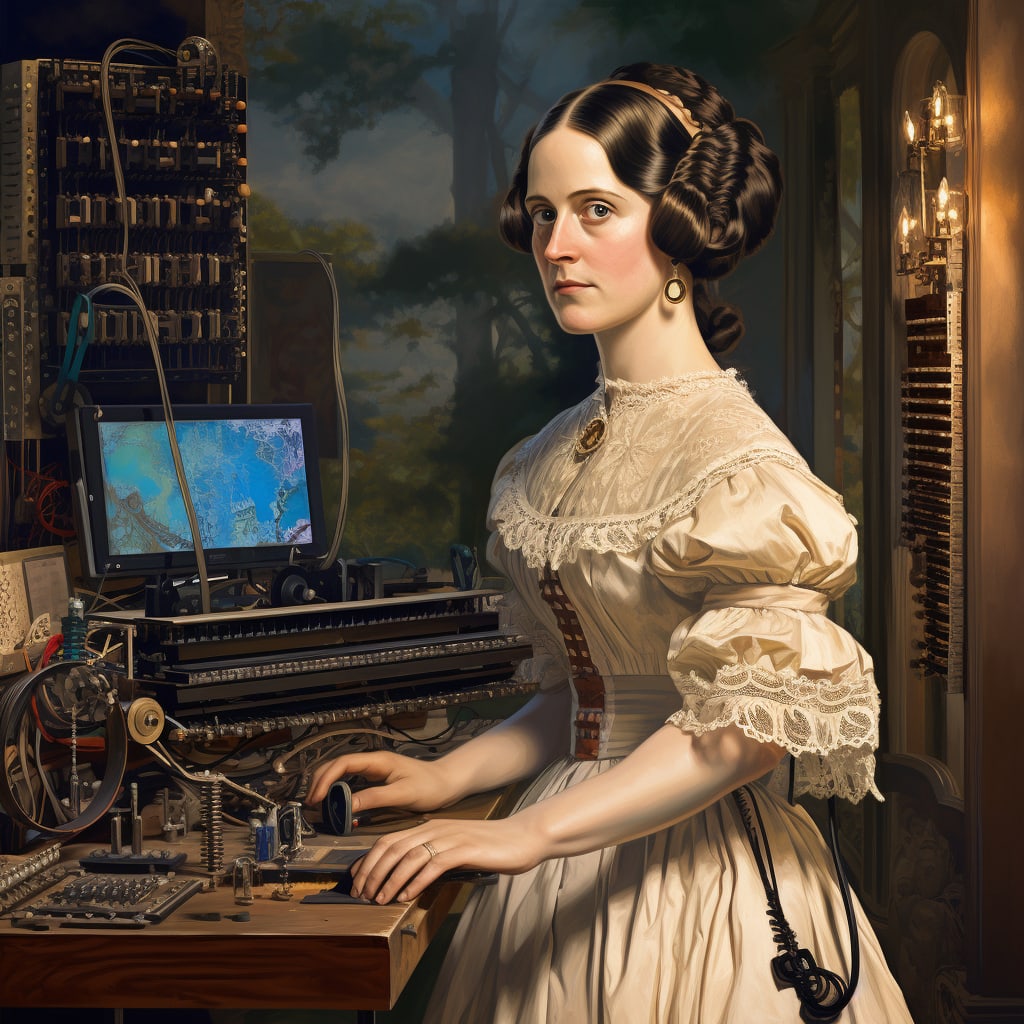
In the marvelous realm of numbers and machines, resided a young woman whose brilliance and determination would etch her name in the annals of history as the world's first computer programmer. This exceptional woman was none other than Ada Lovelace, an English mathematician and writer born in the early 19th century.
Ada Lovelace, also known as Augusta Ada King, Countess of Lovelace, was no ordinary lady of her time. She was born on December 10, 1815, to the esteemed poet Lord Byron and the gifted mathematician Lady Byron. Despite her parents' separation when she was just a month old, Ada was raised by her mother, who had a profound impact on her intellectual development. Lady Byron passionately believed that education should encompass not only the arts but also the sciences, a rather unconventional idea for the era.
Ada's early years were steeped in a world of education and knowledge. She received private tutoring from eminent scholars, immersing herself in various subjects, including mathematics, music, and languages. As her fascination with mathematics grew, Ada's potential became evident, and it became clear that she possessed a rare gift for reasoning and analytical thinking.
However, it was not until she was introduced to Charles Babbage, a mathematician, inventor, and engineer, that Ada's true passion and genius found their purpose. Babbage was working on a groundbreaking invention called the Analytical Engine, a mechanical device that could perform complex mathematical computations. It was a machine far ahead of its time and the precursor to modern-day computers.
Ada's curiosity piqued, and she soon formed a close bond with Babbage. He recognized her intellectual prowess and affectionately referred to her as the "Enchantress of Numbers." Together, they delved into the intricacies of the Analytical Engine, a marvel of engineering that fascinated Ada beyond measure.
As she familiarized herself with the Analytical Engine's inner workings, Ada saw its potential extended beyond mere calculation. Her visionary mind conceived the idea of the machine not only manipulating numbers but also creating art, music, and much more. To achieve this, she realized that the machine needed to be given precise instructions - an algorithm.
In 1843, Ada Lovelace set to work on writing what would become the world's first algorithm intended to be processed by a machine. She described her process in detail in her notes on the Analytical Engine. Ada's algorithm was intended to calculate a sequence of Bernoulli numbers, but she went even further, providing a theoretical framework for general-purpose computation. She had created a set of instructions for the machine to perform any task, laying the foundation for modern computer programming.
Her notes, accompanied by the algorithm, spanned more than three times the length of Babbage's original article on the Analytical Engine. It was a remarkable feat, displaying not only her mathematical brilliance but also her ability to foresee the potential of computing machines decades ahead of her time.
In her notes, Ada Lovelace pondered the possibilities of the Analytical Engine, stating, "The engine might compose elaborate and scientific pieces of music of any degree of complexity or extent." She envisioned the machine becoming an artistic collaborator, sparking creativity in partnership with human minds.
Ada's groundbreaking work had a lasting impact on the world of mathematics and computing. Her notes became a historical artifact, rediscovered, and recognized by later generations as a pivotal moment in the history of computer science. While Charles Babbage's achievements in inventing the Analytical Engine were undoubtedly groundbreaking, Ada Lovelace's contribution of the first published algorithm distinguished her as the true pioneer of computer programming.
Sadly, Ada's life was cut short, as she succumbed to uterine cancer at the early age of 36. Her potential was never fully realized, but her legacy lived on. Her work remained obscure for many years after her death, overshadowed by the male-dominated world of science and mathematics. However, as the world advanced and technology flourished, Ada's brilliance shone through, and she was finally given the recognition she deserved.
In the latter half of the 20th century, Ada Lovelace's notes and contributions became increasingly acknowledged and celebrated. In 1979, the United States Department of Defense even named a programming language "Ada" in her honor, further cementing her place in the history of computer science.
Today, Ada Lovelace is celebrated as a trailblazer, a visionary, and an inspiration to countless women and men entering the field of computer science. Her name is synonymous with innovation and determination, serving as a reminder that gender and societal norms should never be barriers to pursuing one's passion and intellect.
In conclusion, the tale of Ada Lovelace, the first computer programmer, weaves together elements of adventure, intellectual curiosity, and the pioneering spirit. Her journey from a gifted young woman to a visionary mathematician remains a testament to the power of education, perseverance, and the pursuit of knowledge. As technology continues to shape our world, let us always remember Ada Lovelace's legacy and the profound impact her work had on shaping the future of computing. Her story will forever inspire generations to come, reminding them that within the realm of imagination and determination, they too can leave an indelible mark on the pages of history.






Comments (1)
Dear Renée I would be interested by reproduce your illustration in a schoolbook. Where did you find it? Best regards